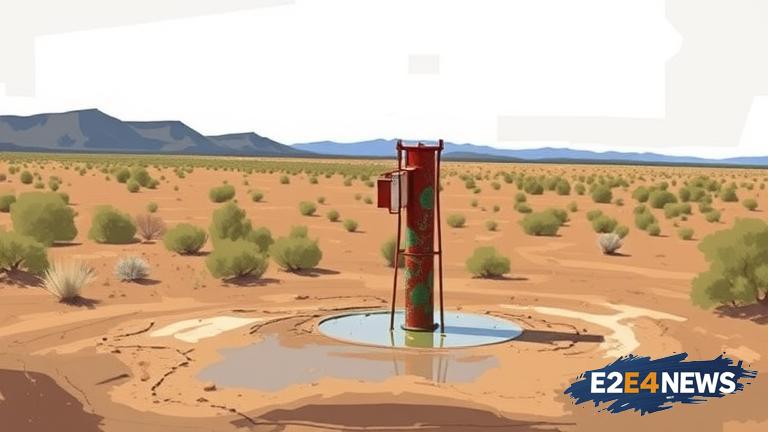New Mexico has recently seen a surge in the construction of illegal water wells, prompting state authorities to issue warnings to residents and landowners. The New Mexico Office of the State Engineer has reported a significant increase in the number of unauthorized water wells being drilled, particularly in rural areas. These illegal wells pose a significant threat to the state’s groundwater resources, as well as the environment and public health. The State Engineer’s office has warned that illegal water wells can lead to the contamination of groundwater, reducing the quality and quantity of this vital resource. Furthermore, the unauthorized drilling of water wells can also lead to the depletion of aquifers, causing long-term damage to the state’s ecosystem. In addition to environmental concerns, illegal water wells also pose a risk to public health, as they can be contaminated with bacteria, viruses, and other pollutants. The New Mexico Environment Department has reported cases of waterborne illnesses linked to contaminated water wells, highlighting the need for proper regulation and monitoring. To address the issue, the State Engineer’s office has launched a crackdown on illegal water wells, with inspectors and enforcement officers working to identify and shut down unauthorized wells. Landowners and residents found to be operating illegal water wells face fines and penalties, as well as the cost of properly plugging and abandoning the well. The state is also working to educate the public about the risks associated with illegal water wells and the importance of obtaining the necessary permits and approvals before drilling. New Mexico’s water resources are already under strain due to drought and climate change, making it essential to protect and conserve this vital resource. The state’s water management strategy includes measures to promote water conservation, efficient use, and sustainable management of groundwater resources. The construction of illegal water wells undermines these efforts, putting the state’s long-term water security at risk. The New Mexico State Legislature has also taken steps to address the issue, introducing legislation to strengthen regulations and enforcement surrounding water wells. The bill aims to increase penalties for those found to be operating illegal water wells and provide additional funding for the State Engineer’s office to enhance its enforcement capabilities. Meanwhile, local communities are also taking action, with some residents forming advocacy groups to raise awareness about the issue and push for greater accountability. The New Mexico Farm and Livestock Bureau has also weighed in on the issue, emphasizing the need for responsible and sustainable water management practices. As the state continues to grapple with the challenges posed by illegal water wells, it is clear that a comprehensive and multi-faceted approach is needed to address this complex issue. This includes not only enforcement and regulation but also education, outreach, and community engagement. By working together, New Mexico can protect its vital water resources and ensure a sustainable future for generations to come. The issue of illegal water wells is not unique to New Mexico, with other states also struggling to address this problem. However, the state’s unique geography and climate make it particularly vulnerable to the impacts of drought and water scarcity. As such, it is essential that New Mexico takes a proactive and comprehensive approach to managing its water resources, including the regulation of water wells. The state’s water management strategy must balance the needs of different stakeholders, including farmers, ranchers, and urban residents, while also protecting the environment and public health. Ultimately, the success of New Mexico’s efforts to address the issue of illegal water wells will depend on the ability of state authorities, local communities, and individual residents to work together towards a common goal.





